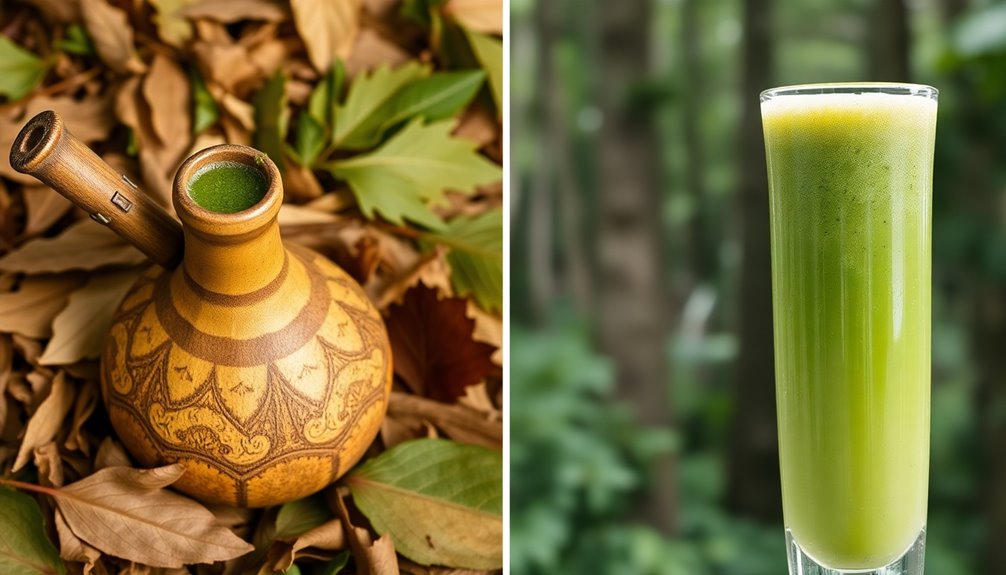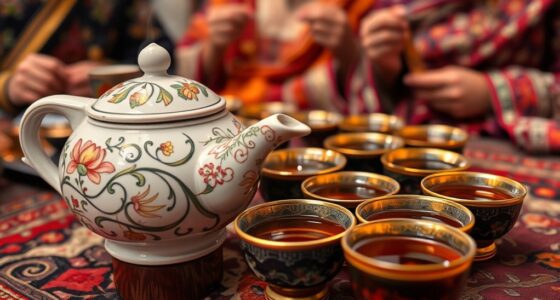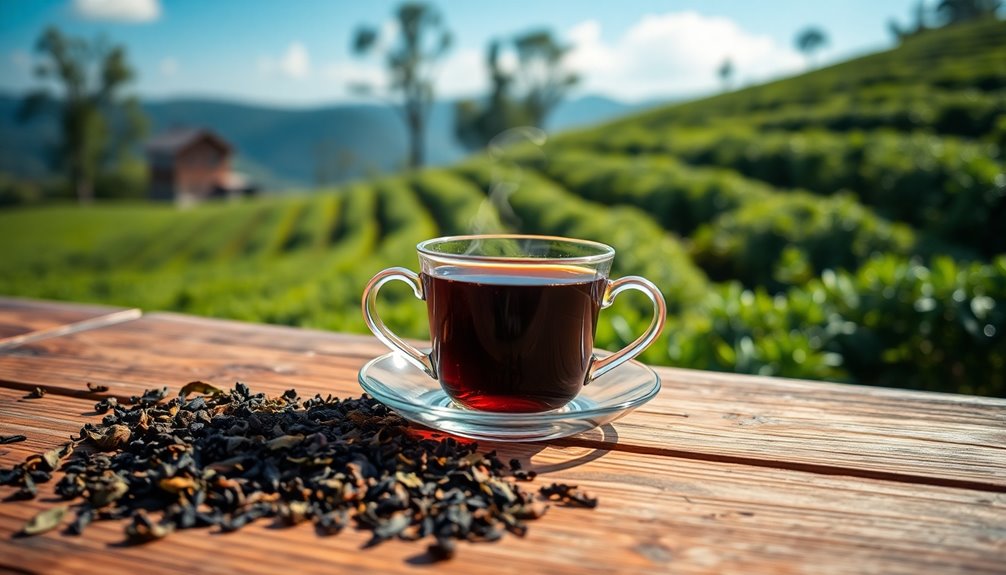Black tea plays an important role in global tea traditions, connecting people through history, culture, and health. It's enjoyed in many countries, from English afternoon tea to Indian chai. Historically, it symbolized wealth but now brings everyone together, especially during social events. Black tea also boasts health benefits, like improving heart health and aiding digestion. It's a part of religious practices too, promoting mindfulness in Buddhism and respect in Hinduism. While globalization has mixed traditions, understanding the rich heritage of black tea enhances your experience. Stick around, and you'll discover even more about this fascinating beverage!
Key Takeaways
- Black tea originated in 17th century China, becoming a staple beverage enjoyed globally through various cultural practices.
- It symbolizes hospitality and community, fostering connections during social gatherings across cultures like England, Turkey, and India.
- Black tea rituals, such as afternoon tea in Britain, highlight its social significance and transition from luxury to everyday consumption.
- Serving black tea during religious rituals, like in Buddhism and Hinduism, emphasizes mindfulness, respect, and community ties.
- Cultural appropriation debates stress the importance of honoring traditional customs and the authentic heritage of black tea practices.
Introduction

Black tea, with its rich aroma and bold flavors, is more than just a beverage; it's a global tradition woven into the fabric of many cultures. Did you know that black tea accounts for over 70% of global tea consumption? This popularity shows how much people enjoy it.
The history of black tea goes back to 17th century China, where tea leaves underwent an oxidation process, creating the darker, more robust flavor we love today.
Different cultures have unique tea traditions. For instance, in Britain, you'll find the delightful ritual of British afternoon tea, where people gather to enjoy tea with tasty treats.
In India, you can savor the spicy warmth of Indian chai, a beloved drink that brings friends and family together. Black tea also plays a significant role in social gatherings and hospitality, like in Turkey, where serving tea symbolizes goodwill.
As tastes change, specialty and flavored black teas are becoming more popular, allowing for diverse tea experiences worldwide.
Cultural Significance of Black Tea
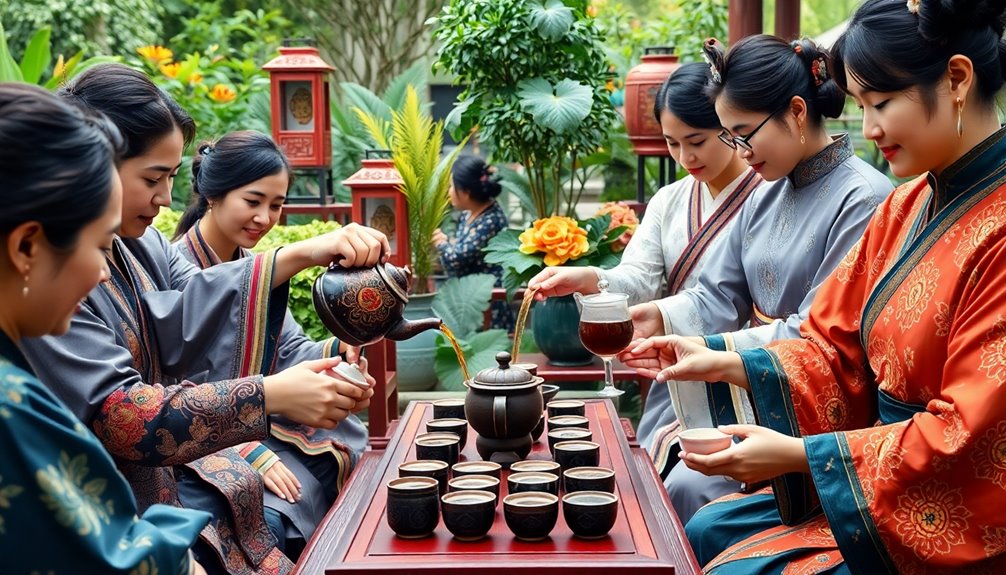
Throughout history, black tea has symbolized wealth and status, especially among aristocrats. You may know that it was introduced to British royalty by Princess Catherine in the 17th century. This drink became essential in British tradition, particularly with the popularization of afternoon tea by Duchess Anna Telford in 1840. This event made black tea more accessible and socially significant for everyone, not just the elite.
In many cultures, black tea represents hospitality and community. You'll find rituals and ceremonies around its preparation and consumption, showcasing its cultural significance. The transition of black tea from a luxury to a common beverage happened as tea prices dropped, allowing more people to enjoy it.
Today, black tea plays a vital role in the tea culture of various countries, including England, Turkey, and India. Each place has its own methods of processing and serving black tea, enhancing its uniqueness and appeal.
From lively gatherings to quiet moments, black tea remains a staple that brings people together. So, whether you're sipping Indian black teas or enjoying a cup during afternoon tea, you're taking part in a rich tradition that celebrates social connections and cultural heritage.
Health Benefits of Black Tea

Black tea has long been celebrated for its cultural significance, but it also offers a range of health benefits that make it a valuable addition to your daily routine.
Black tea is rich in polyphenols, which are powerful antioxidants. These can help combat oxidative stress and may lower the risk of chronic diseases. By drinking black tea regularly, you might see improvements in your cardiovascular health, potentially reducing your chances of ischemic heart disease.
One of the great things about black tea is its natural caffeine content. It can enhance your mental alertness and focus without the jittery effects that often come with coffee.
Plus, the tannins in black tea may aid digestion and help promote the growth of beneficial gut bacteria, which is essential for overall gut health.
If you're looking to manage your weight, black tea might assist by boosting your metabolism and promoting fat oxidation. Additionally, the calming effects of aromatherapy with chamomile can complement the stress-relieving properties of black tea.
Black Tea in Religious Rituals

Steeped in tradition, black tea plays a significant role in various religious rituals across the globe. In Buddhism, you might find black tea served during meditation sessions. It helps promote mindfulness and enhances focus, making it a calming addition to the practice.
Similarly, in Hinduism, offering black tea to guests during religious gatherings is a way to show respect and warmth, embodying the spirit of hospitality.
In some African traditions, black tea is part of ceremonies that honor ancestors. This reflects a deep connection to community and heritage, reinforcing the importance of remembering those who came before us.
During Ramadan, the significance of black tea shines at iftar meals, where it's served to break the fast. Sharing this tea represents a moment of celebration and unity among family and friends.
These rituals and traditions highlight how black tea goes beyond just a beverage. It becomes a symbol of connection, community, and respect in many cultures.
Cultural Appropriation Debates
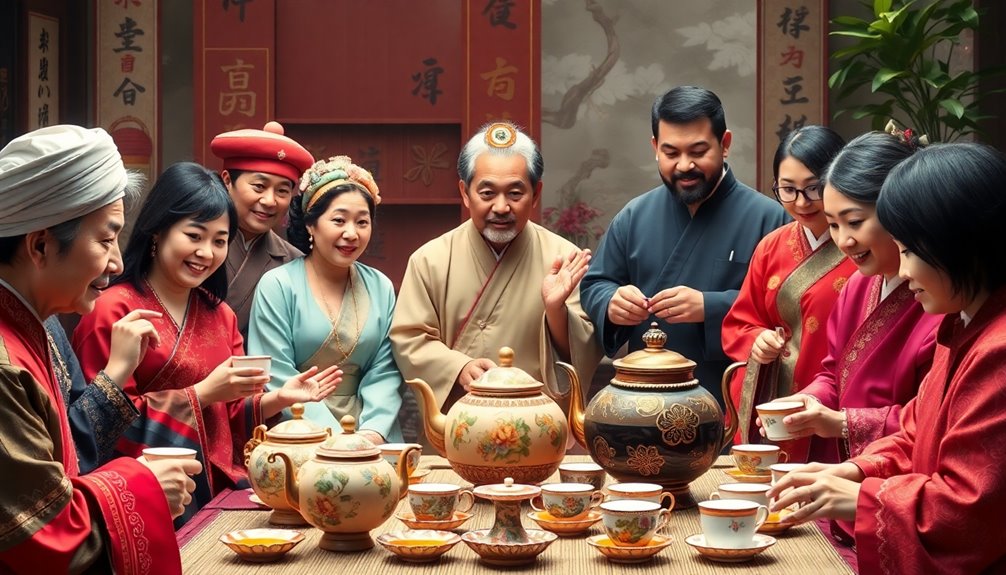
As cultures intertwine, the debates around cultural appropriation in tea practices become increasingly relevant. When you enjoy black tea, it's important to remember the traditional customs and rituals that come from its origins. For instance, practices like the British afternoon tea or the Chinese Gongfu tea ceremony carry deep cultural meaning. Practicing these without understanding their history can be seen as cultural appropriation.
Globalization has made it easier to access diverse tea practices, but it also risks diluting their authenticity. Specialty tea shops popping up in the West sometimes overlook the rich heritage behind black tea. This can lead to a misunderstanding of what these tea-drinking rituals truly represent.
To truly appreciate black tea, you should engage respectfully with its roots. This means learning about its cultural significance and honoring the traditions that surround it. Advocates for cultural sensitivity encourage you to recognize the importance of these traditions while enjoying the flavors and experiences they offer.
Practical Applications
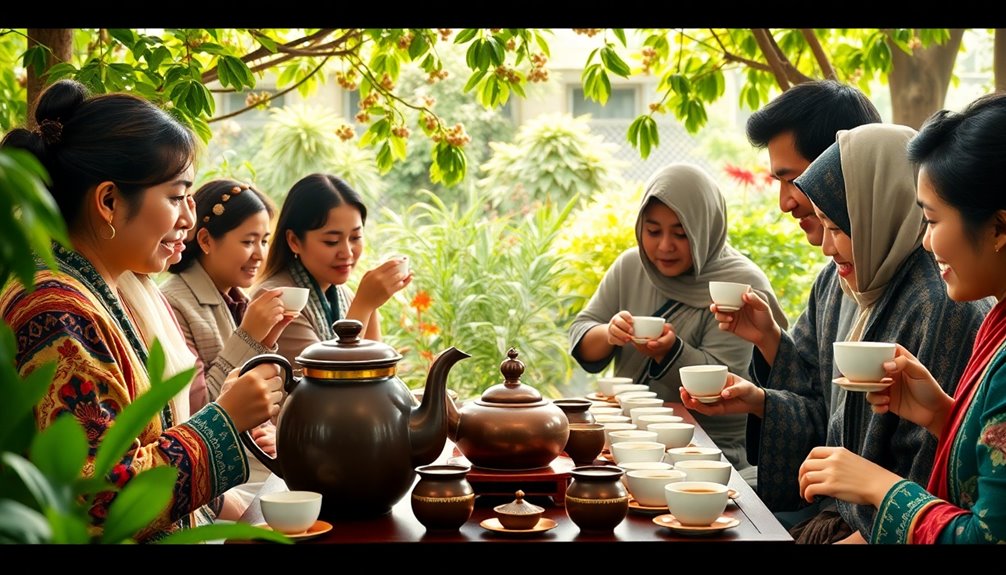
Many people find that incorporating black tea into their daily routines can enhance both social interactions and personal rituals.
For instance, you might enjoy a classic British afternoon tea, where black tea is paired with scones and pastries, making it a delightful experience during social gatherings.
In Turkey, black tea is consumed multiple times a day, often served to guests, showcasing the warmth of hospitality and community.
If you're looking for something with a kick, try Indian chai, which features spiced black tea.
It's not just a drink; it's a comforting ritual that signifies warmth when shared with friends or family.
You can also explore traditional tea ceremonies in China, where the focus is on appreciating the complex flavors and aromas of black tea.
Frequently Asked Questions
What Is the Significance of Black Tea?
Black tea's significance lies in its widespread consumption and cultural symbolism. You'll find it at social gatherings, in rituals, and as a gesture of hospitality, making it a crucial part of various traditions around the world.
What Is the Cultural Significance of Tea?
Tea's cultural significance lies in its ability to foster connections and traditions. You share moments over tea, celebrate rituals, and express hospitality, making it a vital part of social interactions and daily life across various cultures.
What Cultures Drink Black Tea?
You'll find black tea enjoyed in various cultures, from the UK's afternoon tea to Turkey's hospitality rituals. In India, chai is a daily staple, while Russia serves it from a samovar, enhancing social gatherings.
What Impact Did Tea Have on World History?
Tea's impact on world history is immense. It fueled trade, sparked revolutions, and influenced cultures. You can see its effects in global economies and social customs, shaping interactions and conflicts across continents throughout the centuries.
Conclusion
In conclusion, black tea plays an important role in cultures around the world. It's not just a tasty drink; it brings people together and has health benefits, too! From rituals to daily routines, black tea connects us to traditions and each other. As you enjoy your next cup, think about its rich history and the joy it brings to many. So, go ahead, brew a nice cup of black tea, and savor every sip!


